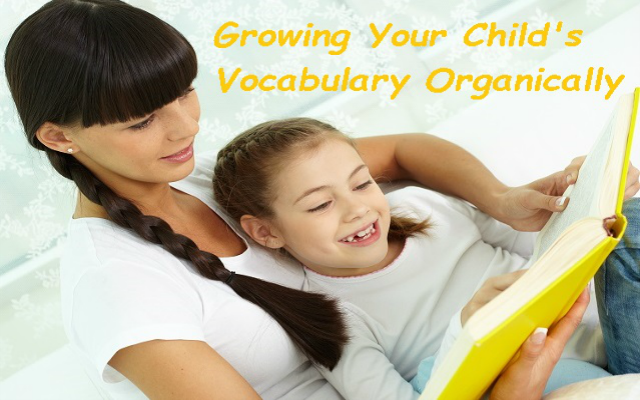Growing Your Child’s Vocabulary Organically


Recently, as we were en route to a camping trip, my six-year-old wondered how much longer the ride would take. Instead of asking, “Are we there yet?” she said, “How much more time until we reach our destination?” My husband and I chuckled at her choice of words, but we weren’t surprised.
In addition, our eight-year-old son was recently evaluated by a speech language pathologist. We discovered that the stroke he suffered at birth has impacted how his mind processes the written word. However, she was surprised to find that his vocabulary and grammar skills, and his ability to understand language and express it verbally, was very advanced for his age.
I have no question as to how this came about. My husband and I followed two steps, which set the stage, so this process could happen organically – no vocab tests or drills needed.
- We made it a point to fill our children’s bookshelves with books that have withstood the test of time. There may be new releases that will become classics one day. However, the books that are generally considered classics are looked upon that way for a reason. We didn’t assume that our children couldn’t understand something that was written in old-fashioned or challenging language, either. If we weren’t sure our child understood a word, we’d simply pause and explain what it meant. Most of the time, we found that they could intuit the meaning through context.
- My husband and I read aloud daily to our children. In The Read-Aloud Handbook, Jim Trelease encourages parents to read aloud daily to their children, even past the age when they are able to read independently. He states, “Kids can usually listen on a higher level than that on which they read. Therefore, children can hear and understand stories that are more complicated and more interesting than anything they can read on their own.” He also explains how words that are attained by the “listening vocabulary” then get transmitted to the speaking vocabulary, reading vocabulary and writing vocabulary. Reading aloud is a bedtime ritual in our home. As our six-year-old’s attention span isn’t the same as her brother’s, they each get to choose their own story. This is a precious bonding time for our family, where we can share our love of reading and introduce stories to our children that were beloved from our own childhoods.
a. Another thing we’ve found to be helpful is playing audio books in the car for our children to listen to. They can usually be borrowed from your local library.
There is no need to be legalistic about this approach. When we go to the library, our daughter often picks picture books that are aesthetically appealing to her, but are not very challenging. That’s fine; I simply add some classic books that I know she’ll like, as well. In the end, she usually prefers what I picked for her.
Although we began this process with our children when they were very young, I think it would be beneficial to begin family read-aloud time with good books at any age. I believe any learning challenges our son may face in the future will be offset by the advantages that his exposure to quality literature has given him. Most importantly, our children have learned that reading is a pleasurable experience, one that you never outgrow.
Heather Eberlin is a married mother of four children, ranging in age from six to twenty-five. She is currently homeschooling her two youngest children and has felt called to share her journey in order to encourage others. She in an amateur gardener who is amazed at the things that God’s creation reveals when you take the time to pay attention to it. You can follow her Musings from My Garden.














































